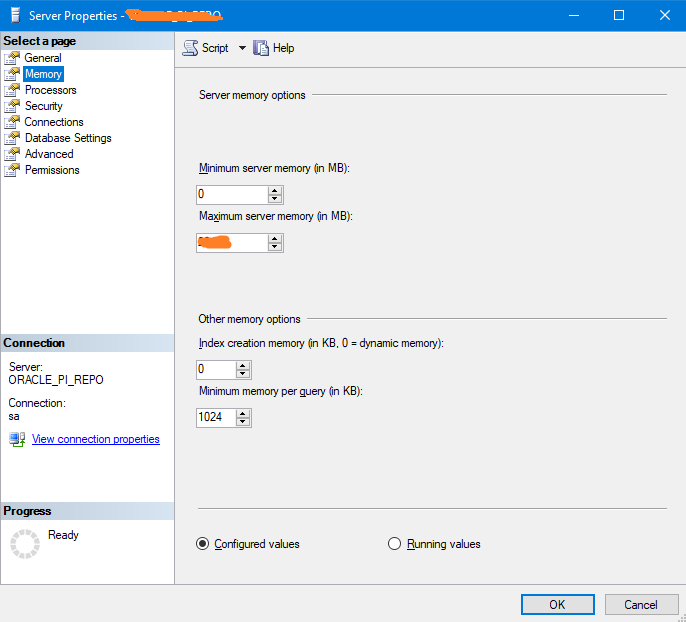CPUs (2.4GHz)* — for a virtual machine the CPU reservation is highly recommended for better performance. The reservation is expressed in MHz.
RAM*- for a virtual machine the memory reservation is highly recommended for better performance.
CPUs (2.4GHz)* - for a virtual machine the CPU reservation is highly recommended for better performance. The reservation is expressed in MHz.
RAM*- for a virtual machine the memory reservation is highly recommended for better performance.
|
Microsoft SQL Server 2016 for Windows* Microsoft SQL Server 2017 for Windows Microsoft SQL Server 2019 for Windows Amazon RDS for SQL Server 2016* |
Microsoft SQL Server 2016 for Windows* - Requires SP1 or SP2 for SQL Server 2016 Standard edition.
Amazon RDS for SQL Server 2016* - Requires SP1 or SP2 for SQL Server 2016 Standard edition.
Antivirus exclusions is required for the Microsoft SQL Server. For more information refer to the Microsoft’s official article How to choose antivirus software to run on computers that are running SQL Server.
RAM*- for a virtual machine the memory reservation is highly recommended for better performance.
Hard Drive Space* - the disk RPM is 15K. For 100 DB agents or above, RAID 5 disk (IOPS is above 1.2K) is required if the performance is downgraded. For 600 DB agents, 9K IOPS disk is required. For Azure SQL Managed instance 12500 IOPS per file and throughput 480MiB per file.
Raw Data* - raw performance data which is stored in 1-minute SQL PI tables.
Long-Term Data* - the low granularity data roll-up from raw data. Long-term (non 1-minute) data is stored in the primary filegroup in the SQL PI Repository. It is highly recommended to store database transaction log and temp database in a different disk with long-term data for better disk IO.
Transaction Log* - The frequency of the transaction log backup job is 2 hours.
CPUs (2.4GHz)* - for a virtual machine the CPU reservation is highly recommended for better performance. The reservation is expressed in MHz.
RAM*- for a virtual machine the memory reservation is highly recommended for better performance.
Hard Drive Space* - the disk RPM is 15K. Extra hard drive space is needed for operating system storage.
The table defines the Hardware requirements based on the number of monitoring agents.
CPUs (2.4GHz)* - for a virtual machine the CPU reservation is highly recommended for better performance. The reservation is expressed in MHz.
RAM*- for a virtual machine the memory reservation is highly recommended for better performance.
CPUs (2.4GHz)* - for a virtual machine the CPU reservation is highly recommended for better performance. The reservation is expressed in MHz.
RAM*- for a virtual machine the memory reservation is highly recommended for better performance.
|
NOTE: Starting with version 5.9.5.20, the back-end Performance Investigator (PI) repository, Infobright is no longer supported, and a new enhanced PI repository based on SQL Server is introduced. For more information about SQL Server based PI repository installation, refer to KB 289910. For how to migrate SQL Server and Oracle database agents from Infobright to SQL Server based PI repository, refer to KB 313191. |
Log in to the SQL Server through SSMS client. Edit the Maximum server memory in Server Properties dialog. For SQL PI Agents number less than 50, set the Maximum SQL Server Memory to 16384 MB. For All-in-One installation, refer to Table 4 row Maximum SQL Server Memory. For others, refer to Table 3 row Maximum SQL Server Memory.
Edit the server.config file located under the <Foglight installation directory>\config directory.
For 4096MB, add the following lines:
server.vm.option0 = "-Xms4096m";
server.vm.option1 = "-Xmx4096m";
Edit the baseline.jvmargs.config file located under the <Agent Manager installation directory>\state\default\config\ directory
For 2048MB, add the following lines:
For number of agents > 50, edit these settings:
|
• |
Data submission channel — edit the fglam.config.xml file located under the <Agent Manager installation directory>\state\default\config\ directory |
|
• |
Number of OS connections — edit the baseline.jvmargs.config file located under the <Agent Manager installation directory>\state\default\config\ directory |
|
NOTE: In the example above, “1024” is a placeholder. The suggested value of maxActiveConnectionsCap is the number of database agents multiplied by 3. |